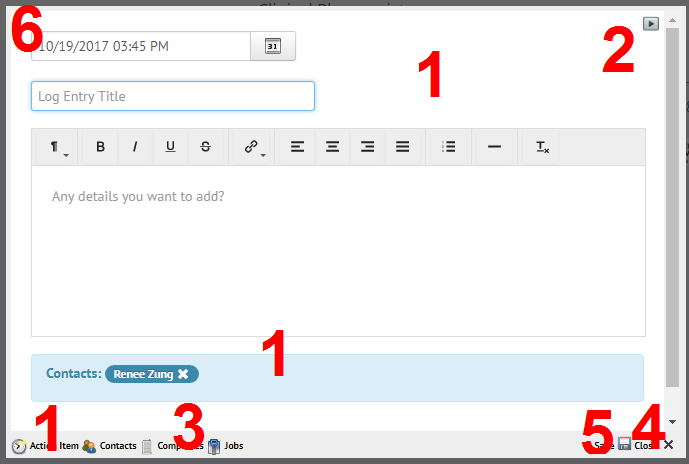I started JibberJobber almost twelve years ago to help people organize a job search and do follow-up better. Today I spent time working on the Log Entry redesign (for the umpteenth time)… the process of redesigning this includes a written document, images, and in this case, a ten minute video. Here’s an image I put in my specs document:
Does this make any sense to you?
Without any context it might make some sense, but I’d bet you don’t know what I really want. My programmers could only assume what I’d want, if I just sent them this image. Hence, the written doc and video.
As I’m working on the specs for this relatively small project I feel a sense of being overwhelmed. This is one of dozens of high priority projects that I’m making specs for. It takes a lot of time to create these specs, but I’ve learned that I can either take the time on the front end (before I give it to my developers) or spend more than five times the amount it should take fixing, recommunicating, redefining, changing, etc.
Like I said, overwhelming.
But I do this, one project at a time, one detail at a time.
And that’s how you eat an elephant: one bite at a time.
Imagine a 12,000 pound elephant in front of you. For perspective, that’s about five times the weight of my car. You have a fork, a pile of napkins, and a limitless supply of water (to wash it down, of course).
Your task: eat the elephant.
Overwhelming, for sure.
One bite at a time.
So here I am, working on my elephant. Down in the depths of details… lots and lots of details. Lots of features, lots of specs, lots of projects.
Overwhelming.
Then I remembered: you eat an elephant one bite at a time, and I can spec this massive amount of work one feature at a time.
This advice, one bite at a time, has been given to me many times throughout my life. And I started to think: I’ve done a lot of big projects. Indeed, I’ve eaten a lot of elephants.
I know that you, in your job search, feels like you are eating an elephant. It’s overwhelming. There are many things to do. It’s foreign. It’s confusing, humiliating, tiring, and an emotional roller coaster.
You already know that you eat it, or do it, one bite at a time.
What I want to remind you of is that this is not your first time. You have previously taken on huge, massive projects. You have successfully eaten other elephants, and you can successfully eat this one.
Intimidating, I know.
Overwhelming, I know.
I also know that YOU CAN DO THIS.
Go for it. Now. One bite at a time.


Great to be reminded, Jason, of HOW to eat an elephant. TY.
Your reminder triggered a lesson I was taught about WHEN to eat the elephant:
As an elephant appears (a task pops up) apply one of the four D’s:
Drop it, Delegate it, Delay it, or Do it.
Consciously choosing one of those strategies every time you face a task will keep things progressing smoothly. AND remember:
Different styles of people approach tasks differently. Understanding the DISC concept of the science of human behavior helps with the how and when to eat your elephant.
Pure ‘D’ styles are great at “doing” and “delegating” but could improve on how to delegate. They need to take time to explain each task, realize that other styles may take longer to start and finish. Remember to say “please” and “thank you.”
Pure ‘I’ styles are great at starting big projects, but struggle to finish many of them. They need to focus on accomplishing the small steps each day. They thrive on small pats on the back. They need to continually remind themselves (through positive affirmations) that they are becoming more focused and more productive each day.
Pure ‘S’ styles are very persistent people. They stick with projects until completion. However, they need to work on their confidence by soliciting less feedback during the process and presenting larger chunks of work for approval.
Pure ‘C’ styles are great at perfecting projects, but they sometimes get lost in the details. Often, 95% correct (and out the door) beats “perfect but late.” They need to find someone else to “perfect” their work and learn to finish sooner.
Keep up the great work with JibberJobber, Jason! In support of your continued success!
This is great insight, Jane, thank you for sharing. One of the problems with not understanding what you are talking about is that you compare yourself to others and wonder what’s wrong with you. The insight into your own style and approach should help that quite a bit.